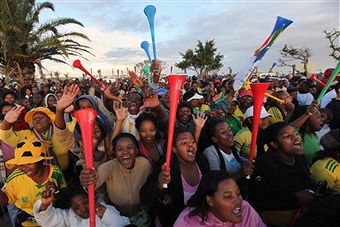“On the other side of that roundabout, there will be goats by the side of the road.”
Few places better illustrate the vast wealth disparities that still exist in South Africa today than Alexandria.
Just up the road is Sandton, swankiest of swanky Johannesburg suburbs and FIFA’s home from home until July 11.
Barely two minutes away, you can be driving along streets of affluent tree-shaded residences.
Then, abruptly, you arrive into the middle of a vast ramshackle market with stalls selling basic provisions such as onions and footwear jumbled up in big mix-and-match piles.
Every face in the street is, of course, black.
We have come to Alexandria to watch a football match.
Not here in the market, but at a local bar-cum-restaurant called Joe’s Butchery.
And after the questions we at Insideworldfootball have raised in the past over whether the World Cup would improve the lives of ordinary South Africans, it is good to report that this is one local business that the tournament does really seem to be helping to thrive.
What is more, though the key ingredient in the enterprise’s success is undoubtedly the energy and expertise of Laly and William Mathebula, the niece and uncle team who run it, they are benefiting from a little helping hand administered through an unusually enlightened programme delivered by one of FIFA’s global sponsors.
Joe’s Butchery is one of about 1,000 “taverns” across South Africa that the soft drinks giant Coca-Cola has kitted out as unofficial World Cup viewing sites.
 Around 150 of these, including the Mathebulas’ restaurant, have been supplied with large LCD televisions screening all the World Cup games live.
Around 150 of these, including the Mathebulas’ restaurant, have been supplied with large LCD televisions screening all the World Cup games live.
Such largesse does have certain consequences: from the branding around the TV set itself to the ad on the roof of the room we sit in, you wouldn’t easily miss that all-important “C”word.
But the Mathebulas seem happy enough with the arrangement.
“Very much so,” they reply when I ask if they have had more customers in recent weeks than they would have had without the World Cup.
“On Sunday we had 800 for Germany against England.”
One of the reasons I think the initiative has worked is that it seeks to build on an existing commercial relationship.
The Mathebulas recall that they started buying Coke products, at a rate of just three or four cases a week, three years ago.
Though they say Coke has not told them they cannot sell other beverage brands, this volume is now up to around 35 cases.
“Coke never came with empty promises,” they say.
“Everything they promised, they delivered.”
As the name of the restaurant suggests, one of its chief selling-points is the quality of the grilled meat meals it serves to customers.
Coca-Cola is also benefiting from this reputation via special offers encouraging diners to wash their meal down with a Coke.
One menu displayed on the wall offered “Coke 500ml + T Bone, Pap + Chakalaka” for Rand88.88.
The clientele are plainly a discerning bunch: the match we had arrived to see was a clunker - Japan versus Paraguay - and they had stayed away in their droves.
But the visit taught us an important lesson: yes it is possible even for huge multinationals to do good business in the South African townships.
David Owen is a specialist sports journalist who worked for 20 years for the Financial Times in the United States, Canada, France and the UK. He ended his FT career as sports editor after the 2006 World Cup and is now freelancing, including covering last year’s Beijing Olympics. He is tweeting from South Africa at www.twitter.com/dodo938
.jpg)